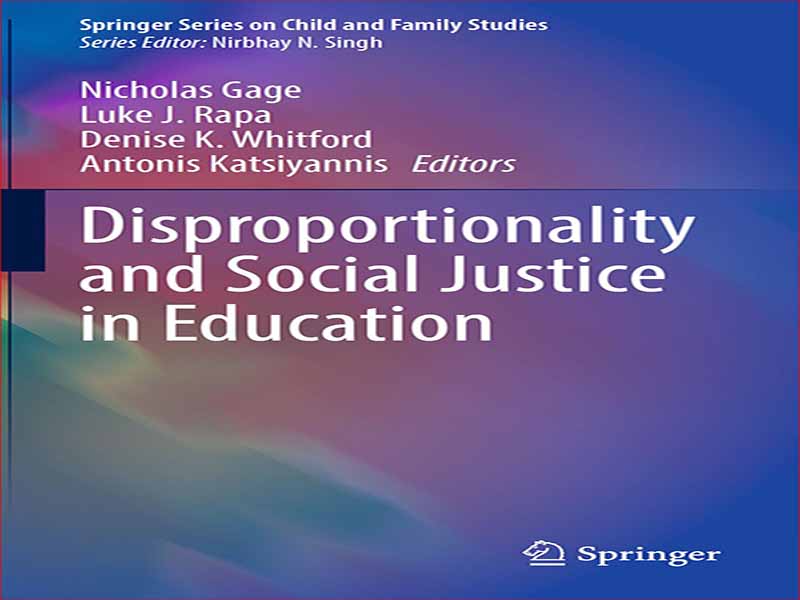- عنوان کتاب: Disproportionality and Social Justice in Education
- نویسنده: Nicholas Gage
- حوزه: آموزش و پرورش
- سال انتشار: 2022
- تعداد صفحه: 304
- زبان اصلی: انگلیسی
- نوع فایل: pdf
- حجم فایل: 8.50 مگابایت
این کتاب عدم تناسب در آموزش را از طریق مجموعهای از فصول با تمرکز بر مسائل عدالت اجتماعی برای دانشآموزان متنوع و به حاشیه رانده شده در ایالات متحده بررسی میکند. این نامتناسب را به عنوان شاخصی از اعمال مغرضانه از سوی سیستم ها و افراد مورد توجه قرار می دهد و از عدالت اجتماعی به عنوان چارچوبی برای مفهوم سازی نامتناسب استفاده می کند – هم از نظر تاریخی و هم به عنوان وسیله ای برای بهبود عملکرد آموزشی در حال حاضر و آینده. فصلهایی که در این کتاب گنجانده شده است، ریشههای تاریخی عدم تناسب در آموزش، نتایج تجربه شده توسط دانشآموزان و دانشآموزان دارای ناتوانیهای دارای تنوع نژادی و قومی را بررسی میکند، و اینکه چگونه عدالت اجتماعی میتواند سیاستگذاری و عملکرد را برای تأثیر مثبت و کاهش عدم تناسب در آموزش و پرورش بیان کند. بخش اول کتاب دانش و دیدگاههای اساسی در مورد مطالعه عدم تناسب در آموزش ارائه میکند. فصلهای موجود در این بخش به عدم تناسب از دیدگاههای تاریخی، قانونی، نظری و روششناختی میپردازند. به این ترتیب، این فصل ها مروری بر منشأ و وضعیت فعلی مطالعات عدم تناسب در آموزش و پرورش ارائه می دهند، در حالی که جنبه های خاصی از مطالعات عدم تناسب را نیز زیر سوال می برند. در مجموع، این فصول زمینه را برای زمینه سازی مطالعات عدم تناسب گذشته و کنونی در آموزش و پرورش فراهم می کند. بخش دوم کتاب به عنوان بررسی عدم تناسب در آموزش با استفاده از داده های معاصر عمل می کند. فصلهای این بخش با تکیه بر دادههای جمعآوریشده از طریق مجموعه دادههای حقوق مدنی 2017-2018، عدم تناسب را در طیفی از نتایج، با توجه خاص به عدم تناسب در خطوط قومی-نژادی، جنسیتی، و وضعیت معلولیت بررسی میکنند. بهطور جداگانه، فصلها به عدم تناسب از نظر محرومیتهای انضباطی، قربانی شدن و ارتکاب قلدری، گوشهگیری و محدودیتها، تنبیه بدنی، ارجاعها و دستگیریهای مجری قانون مبتنی بر مدرسه، و پیشرفت تحصیلی میپردازند. با هم بخوانید، این بخش از کتاب دیدگاهی جامع و جاری از عدم تناسب برای دانشآموزان مدارس آمریکا ارائه میکند. بخش سوم کتاب عدم تناسب را در وضعیت کنونی آن در نظر می گیرد و در عین حال آینده ای جایگزین ممکن را در نظر می گیرد که در آن عدم تناسب دیگر برای جوانان ما موضوعی نیست. فصلهای این بخش که از دریچهای از عدالت اجتماعی، و با نگاهی به برابری چارچوببندی شدهاند، چگونگی اعمال تمرین، تحقیق، سیاست و مداخله آموزشی را در نظر میگیرند تا شرایطی را شکل دهند که از نتایج عادلانهتر و عادلانهتر برای همه افراد حمایت کند. جوانان. این کتاب ابزار مفیدی برای سیاستگذاران، محققان کاربردی و دانشجویان تحصیلات تکمیلی پیشرفته است که علاقه مند به درک و رسیدگی به عدم تناسب در آموزش هستند. همچنین برای تمرینکنندگان و مداخلهگرانی که در مدارس، سازمانهای مبتنی بر جامعه و سایر محیطهای جوانان کار میکنند مفید است. ما امیدواریم که این کار به نفع همه کسانی باشد که از دانشآموزان در فضای آموزشی کنونی حمایت میکنند – فضایی که در آن عدالت و عدالت به شدت مورد نیاز است، شاید اکنون بیش از هر زمان دیگری.
This book examines disproportionality in education through a compilation of chap¬ters focusing on issues of social justice for diverse and marginalized students in United States. It addresses disproportionality as an indicator of biased practices, on the part of systems and individuals, and it uses social justice as the frame for con¬ceptualizing disproportionality—both historically and as a means to improve educa¬tional practice now and in the future. Chapters included in this book explore the historical roots of disproportionality in education, outcomes experienced by racially and ethnically diverse students and students with disabilities, and how social justice can inform policy and practice to make a positive impact and reduce disproportion¬ality in education.
The first section of the book provides foundational knowledge and perspectives on the study of disproportionality in education. Chapters included in this section address disproportionality through historical, legal, theoretical, and methodological lenses. As such, these chapters provide an overview of the origins and the current state of disproportionality studies in education, while also questioning certain aspects of disproportionality studies. In sum, these chapters lay the groundwork for contextualizing past and current disproportionality studies in education.
The second section of the book serves as a survey of disproportionality in educa¬tion using contemporary data. Drawing on data collected through the 2017–18 Civil Rights Data Collection, chapters in this section examine disproportionality across a range of outcomes, with specific attention to disproportionality across ethnic-racial, gender, and disability status lines. Individually, chapters address disproportionality in terms of disciplinary exclusions, bullying victimization and perpetration, seclu¬sion and restraints, corporal punishment, school-based law enforcement referrals and arrests, and academic achievement. Read together, this section of the book pro¬vides a comprehensive and current view of disproportionality for students in American schools.
The third section of the book considers disproportionality in its current state while envisioning a possible alternative future where disproportionality is no longer an issue for our youth. Framed through a lens of social justice, and with a view toward equity, the chapters in this section consider how educational practice, research, policy, and intervention might be applied in order to shape conditions that are supportive of more equitable and just outcomes for ALL youth.
This book is a useful tool for policy makers, applied researchers, and advanced graduate students interested in understanding and addressing disproportionality in education. It is also useful for practitioners and interventionists working in schools, community-based organizations, and other youth settings. We hope this work ben¬efits all those who support students in the current education climate—one where equity and justice are sorely needed, perhaps now more than ever.
این کتاب را میتوانید از لینک زیر بصورت رایگان دانلود کنید:
Download: Disproportionality and Social Justice in Education

































نظرات کاربران